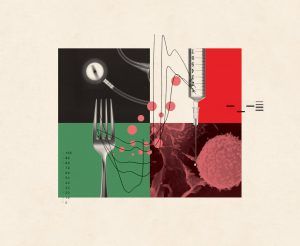Siddhartha Mukherjee in The New York Times:
 In the 1920s, Otto Warburg, a German physiologist, demonstrated that tumor cells, unlike most normal cells, metabolize glucose using alternative pathways to sustain their rapid growth, provoking the idea that sugar might promote tumor growth. You might therefore expect the medical literature on “sugar feeding cancer” to be rich with deep randomized or prospective studies. Instead, when I searched, I could find only a handful of such trials. In 2012, a team at the Dana-Farber Cancer Institute in Boston divided patients with Stage 3 colon cancer into different groups based on their dietary consumption, and determined their survival and rate of relapse. The study generated provocative data — but far from an open-and-shut case. Patients whose diets consisted of foods with a high glycemic load (a measure of how much blood glucose rises after eating a typical portion of a food) generally had shorter survival than patients with lower glycemic load. But a higher glycemic index (a measure of how much 50 grams of carbohydrate from a food, which may require eating a huge portion, raises blood glucose) or total fructose intake had no significant association with overall survival or relapse.
In the 1920s, Otto Warburg, a German physiologist, demonstrated that tumor cells, unlike most normal cells, metabolize glucose using alternative pathways to sustain their rapid growth, provoking the idea that sugar might promote tumor growth. You might therefore expect the medical literature on “sugar feeding cancer” to be rich with deep randomized or prospective studies. Instead, when I searched, I could find only a handful of such trials. In 2012, a team at the Dana-Farber Cancer Institute in Boston divided patients with Stage 3 colon cancer into different groups based on their dietary consumption, and determined their survival and rate of relapse. The study generated provocative data — but far from an open-and-shut case. Patients whose diets consisted of foods with a high glycemic load (a measure of how much blood glucose rises after eating a typical portion of a food) generally had shorter survival than patients with lower glycemic load. But a higher glycemic index (a measure of how much 50 grams of carbohydrate from a food, which may require eating a huge portion, raises blood glucose) or total fructose intake had no significant association with overall survival or relapse.
While the effect of sugar on cancer was being explored in scattered studies, the so-called ketogenic diet, which consists of high fat, moderate protein and low carbohydrate, was also being promoted. It isn’t sugars that are feeding the tumor, the logic runs. It’s insulin — the hormone that is released when glucose enters the blood. By reducing carbohydrates and thus keeping a strong curb on insulin, the keto diet would decrease the insulin exposure of tumor cells, and so restrict tumor growth. Yet the search for “ketogenic diet, randomized study and cancer” in the National Library of Medicine database returned a mere 11 articles. Not one of them reported an effect on a patient’s survival, or relapse.
More here.
